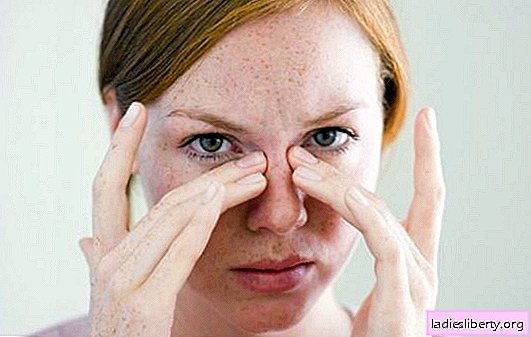
Inflammation of the maxillary sinuses or sinusitis is a fairly complex disease, which is characterized by many unpleasant symptoms and the risk of complications. Let us consider in more detail the manifestations and methods of treating maxillary sinus inflammation.
Causes of sinusitis inflammation
The causes of maxillary sinus inflammation are:
1. An infection that enters the nasal cavity when breathing.
2. Curvature of the nasal septum.
3. Hypertrophic rhinitis.
4. Allergic diseases.
5. Immunity, which develops due to long-term chronic diseases.
6. Injury of the maxillary sinuses.
7. Not completely cured runny nose.
8. Stay in a draft.
9. Previously transferred influenza or SARS.
10. Ingestion of pathogenic bacteria into the nasopharynx.
11. Ingestion of harmful chemical fumes.
12. Not cured colds, which gave a complication in the form of sinusitis.
13. Non-compliance with oral hygiene, which is why bacteria multiply in it. (It can also cause the development of sinusitis).
14. Various structural defects in the nasopharynx.
15. Tuberculosis.
16. Fungal infection of the nasal mucosa.
Inflammation of the maxillary sinuses: symptoms and features of the course
Acute sinusitis is characterized by the following symptoms:
1. Loss of strength and weakness.
2. Ailment.
3. Loss of appetite.
4. An increase in body temperature.
5. Severe, growing headache. The nature of the pain: throbbing, constricting, paroxysmal or aching.
6. A feeling of heaviness in the forehead or on one side of the head.
7. The appearance of mucous discharge from the nose, which can be from yellow to dark green. Over time, mucous discharge can be with pus.
8. Swelling of the face and its redness.
9. Pain when tapping on the maxillary sinuses and teeth.
10. Permanent stuffiness of one or both nostrils, which is not eliminated by ordinary nasal drops.
11. Pain when tilting the head.
12. Shortness of breath.
13. Loss of performance.
14. Memory impairment.
15. Chills.
16. Pain in the eyes or ears.
17. Partial hearing loss.
18. Attacks of coughing.
19. The development of rhinitis.
Chronic inflammation of the maxillary sinuses causes the following symptoms:
1. A slight increase in body temperature, which is observed in the evening.
2. Aching pains in the head and nose, which are not relieved by conventional analgesics.
3. Migraine.
4. Ailment manifested by the end of the day.
5. Blue of the nasal mucosa (only an ENT doctor can detect).
6. Thickening of the nasal mucosa.
7. The appearance of a putrid odor from the nose.
8. Nausea.
9. Fatigue.
10. Alternating congestion of one or the other sinus.
11. Chronic runny nose.
12. The patient may experience abundant mucous or purulent discharge from the nose.
13. Shortness of breath.
14. Sleep disturbance.
15. Irritability.
I must say that chronic sinusitis lasts longer and easier than acute, but it is more dangerous, as it can easily cause serious complications when neglected.
Methods for treating maxillary sinus inflammation
The traditional treatment of sinusitis involves the following:
• drug treatment;
• physiotherapy;
• alternative treatment;
• methods of prevention.
Drug treatment includes the following:
1. If sinusitis was caused by infection, then it must be eliminated with antibiotics in the form of injections or nasal sprays.
2. The use of decongestants (phenylephrine).
3. In acute infections, the patient should be prescribed a synthetic antibiotic of the penicillin group Amoxicillin.
4. Patients in whom sinusitis has arisen due to an allergy should use the antibiotic Trimethoprim.
5. Antihistamines (Loatadin, Claninex).
6. Anesthetics (Ibuprofen, Aspirin).
7. Mucolytics are used to prevent the accumulation of mucus.
In order to get rid of maxillary sinus inflammation as soon as possible, you should adhere to such recommendations:
1. You need to drink plenty of fluids so that the body can better fight infections and not become dehydrated. It is also advisable to drink warm chamomile or green tea (to prevent the accumulation of mucus in the nose).
2. You can do steam inhalation over a bowl of hot boiled potatoes and essential oils. In this case, you need to cover the head with a towel.
It is important to know, that inhalation can be done only on the initial manifestations of sinusitis. If it is started and pus comes out of the patient’s nose, then this procedure is contraindicated.
3. It is necessary to observe bed rest and avoid inhalation of cold air.
4. Use a humidifier.
5. Rinse your nose several times a day with saline solutions or nasal sprays to cleanse it of mucus and dangerous bacteria. You can also gargle with warm salt water.
6. In days of weakness, you need to give up any physical activity.
7. It is important not to start your condition with severe malaise or an increase in body temperature to consult a doctor.
8. If you need to blow your nose, you need to do this carefully, since strong pressure can clog the sinuses and completely clog them.
9. It is also very important to avoid inhalation of various irritants (the smell of cosmetics, perfume, cigarette smoke, etc.), since they will only aggravate the situation of the patient.
10. It is necessary to do regular ventilation of the room in which the patient is located.
It is important to know, that you can’t take medications on your own if your doctor has not prescribed them. This is especially true for the independent treatment of young children.
If the traditional medical and physiotherapeutic treatment of sinusitis was not effective enough, then the patient is prescribed surgical treatment - a maxillary sinus puncture or puncture.
This procedure is done by introducing a special needle into the sinus, with which help accumulated pus is removed from the patient. Special antibacterial drugs are also introduced into the same sinus. Thus, drugs fall into the focus of inflammation and can act directly.
After the puncture, most patients almost immediately feel relief, as they become less unpleasant symptoms of the disease. Despite this, in order to achieve the maximum therapeutic effect, several similar manipulations will be required.
To reduce soreness, today most clinics practice installing a catheter in the maxillary sinus. This will make it possible to avoid re-puncture. After the patient's condition improves, such a catheter is removed. At the site of its establishment, the patient has a small speck that over time will heal and will not be visible.
It is also worth dispelling the persistent myth that if he made a puncture during sinusitis, then he will have to do it with every sinus inflammation. In fact, this is not entirely true: after a puncture, the affected sinus completely heals and recovers. This procedure does not cause any interaction with the subsequent possible manifestations of sinusitis.
Moreover, surgical puncture of the sinus is an extreme measure, which is carried out only at possible risks to the patient's condition. Typically, sinusitis can be treated with medications without resorting to this procedure.
Maxillary sinus inflammation: treatment, complications, prevention
With untimely treatment of sinusitis, a sick person may develop such complications:
1. Chronic migraine.
2. Hearing impairment.
3. Visual impairment.
4. An abscess of the orbit.
5. Phlegmon.
6. Intracranial abscess.
7. Meningitis.
8. Sepsis.
9. Chronic fatigue.
In order to prevent the development of sinusitis, you should adhere to such prevention rules:
1. Get the flu vaccine every year.
2. Dress for the weather.
3. In time to treat diseases that can give complications in the form of sinusitis.
4. If the first signs of this disease occur, do not delay the trip to the doctor.
5. Always wash your hands after contact with people with acute viral or bacterial diseases.
6. Eat a balanced diet so as not to weaken the immune system. Also, in the offseason, it is recommended to additionally take vitamin complexes.
7. Quickly get rid of a cold and prevent its transition to a chronic form.
8. People suffering from allergies need to drink the necessary drugs in advance.











